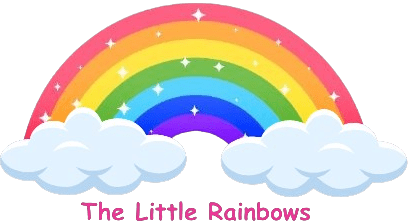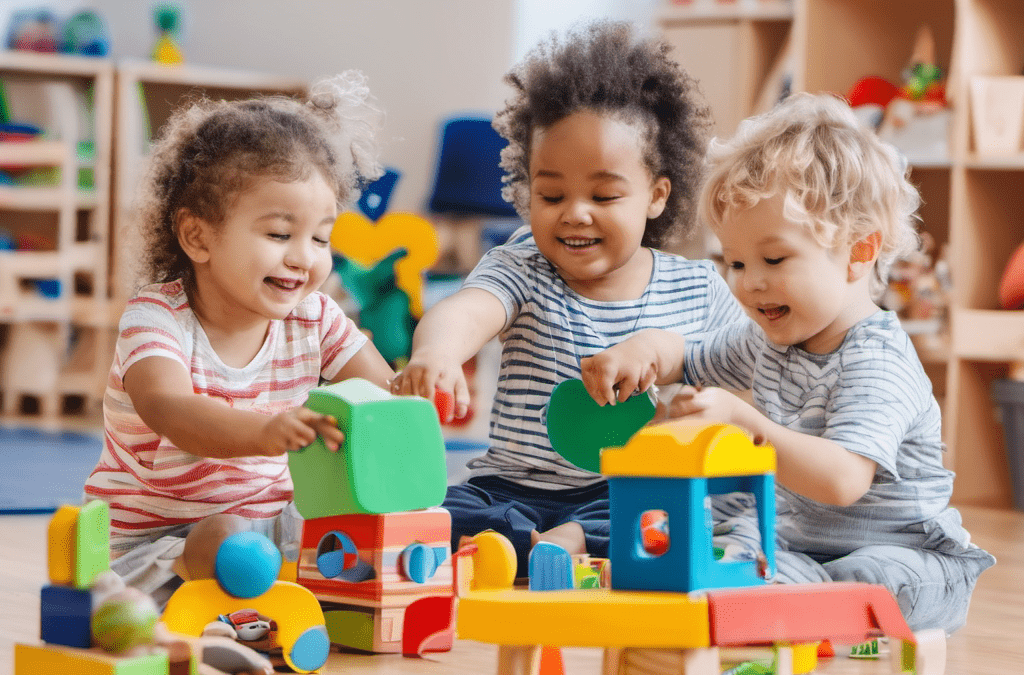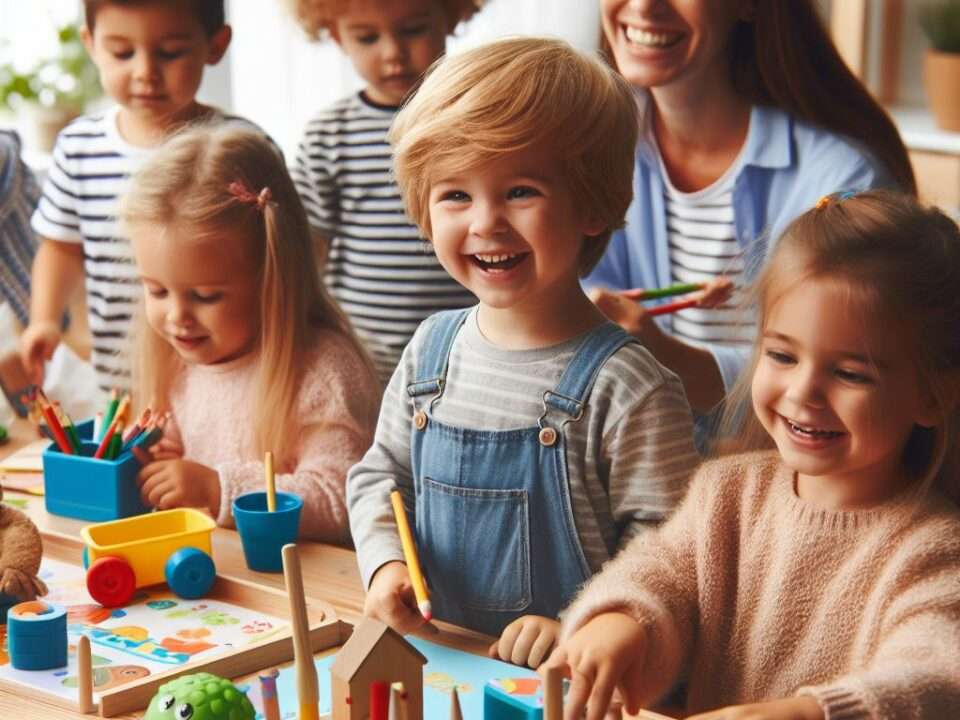How Preschool Education Sets the Foundation for Lifelong Learning

Why Play School Education is Important for Your Child
17 December 2023How Preschool Education Sets the Foundation for Lifelong Learning
Introduction
Preschool education plays a crucial role in shaping a child's future. It serves as the building blocks for lifelong learning, cultivating cognitive development, promoting social and emotional growth, and nurturing creativity and imagination. By providing a solid foundation in these areas, preschool education empowers children and equips them with the necessary skills to navigate the challenges of the ever-evolving world. Let's explore the vital role of preschool education in establishing lifelong learning skills.
I. Importance of Early Childhood Education
A. Building Blocks for Lifelong Learning
Preschool education acts as the cornerstone for lifelong learning. It provides children with a solid foundation of knowledge, skills, and attitudes that will serve as the basis for their future academic and personal development. Preschool lays the groundwork for acquiring essential skills such as language and numeracy, critical thinking, problem-solving, and social interaction.
B. Shaping Cognitive Development
Cognitive development is a fundamental aspect of a child's learning journey. Preschool education introduces children to language, math, logic, and other cognitive skills that form the basis of their intellectual growth. By engaging in age-appropriate activities and exercises, children are exposed to new concepts and ideas that stimulate their cognitive abilities and expand their intellectual horizons.
C. Promoting Social and Emotional Growth
Preschool education also plays a pivotal role in fostering social and emotional growth. At this stage, children learn to interact with their peers, develop empathy and perspective-taking skills, and manage their emotions effectively. Through structured and guided activities, they learn important social skills such as sharing, cooperation, and collaboration, which are vital for building healthy relationships and navigating social situations throughout their lives.
II. Cognitive Development in Preschool Education
A. Language Acquisition
1. Language Development Milestones
One of the primary focuses of preschool education is language development. During this stage, children are exposed to a rich variety of vocabulary and language structures, enabling them to acquire new words and express themselves fluently. Preschool teachers carefully monitor and assess language development milestones, ensuring that children progress in their ability to communicate effectively.
2. Enhancing Vocabulary and Communication Skills
Preschool education creates an environment that nurtures language skills. Through storytelling, engaging discussions, and interactive activities, preschoolers enhance their vocabulary and develop their communication skills. The use of rhymes, songs, and word games also helps them gain confidence in expressing their thoughts and ideas.
3. Fostering Reading Readiness
Preschool education also focuses on fostering reading readiness in children. Teachers introduce them to letters, sounds, and pre-reading skills, such as recognizing symbols and understanding basic sentence structures. By incorporating storytelling and read-aloud sessions, preschoolers develop a love for books and become familiar with the conventions of reading, setting the stage for a lifelong passion for literature.
B. Math and Logical Thinking
1. Introduction to Numbers and Quantities
Preschool education introduces children to fundamental mathematical concepts such as numbers, quantities, and basic operations. Through hands-on activities, games, and puzzles, children start to grasp the concept of measurement, counting, and comparing. These early math experiences lay the foundation for more complex mathematical reasoning and problem-solving skills in the future.
2. Problem-solving Techniques
Preschool education encourages children to develop problem-solving techniques. Through age-appropriate puzzles, riddles, and open-ended tasks, children learn to think critically and analyze different situations. They acquire the ability to identify problems, consider multiple solutions, and select the most suitable option, fostering a crucial mindset for creative problem-solving throughout their lives.
3. Pattern Recognition and Sequencing
Preschoolers engage in activities that enhance their ability to recognize patterns and sequences. Through the use of visual aids, manipulatives, and games, they learn to identify and extend patterns, fostering logical thinking and spatial reasoning. This skill serves as a foundation for future mathematical concepts and scientific inquiry.
C. Cognitive Skill Enhancement
1. Memory and Attention Improvement
Preschool education helps improve children's memory and attention skills. Engaging activities and repetitive exercises enhancing memory retention and concentration. Preschoolers learn strategies to enhance their focus and attention, such as following directions, maintaining eye contact, and actively participating in group discussions.
2. Critical Thinking and Decision Making
Critical thinking and decision-making skills are nurtured through various activities in preschool education. Children are encouraged to explore, ask questions, and think critically about the information presented to them. They develop the ability to analyze situations, consider different perspectives, and make informed decisions, thus equipping them with the essential skills to navigate complex problems throughout their lives.
3. Developing Curiosity and Exploration
Preschool education fosters curiosity and a sense of exploration in children. Through hands-on experiences, field trips, and interactive learning, children develop a deep love for learning and an inquisitive mindset. They are encouraged to seek information, ask questions, and explore their surroundings, igniting their genuine curiosity and fueling their lifelong love for learning.
III. Social and Emotional Growth in Preschool Education
A. Social Skills Development
1. Establishing Positive Relationships
Preschool education plays a critical role in helping children develop positive relationships with their peers and teachers. Through group activities, structured play, and cooperative learning, children learn to communicate effectively, resolve conflicts peacefully, and develop empathy towards others. These social skills contribute to their ability to form lasting and meaningful relationships throughout their lives.
2. Enhancing Cooperation and Collaboration
Cooperation and collaboration are essential skills that are nurtured in preschool education. Children engage in group projects, team activities, and shared decision-making, fostering a sense of belonging and teamwork. They learn the importance of working together towards common goals and appreciating diverse perspectives, strengthening their ability to collaborate effectively in future academic and professional contexts.
3. Encouraging Empathy and Perspective-Taking
Preschool education also places a strong emphasis on empathy and perspective-taking. Through storytelling, role-playing, and discussions on emotions, children develop the ability to understand and relate to others' feelings. They learn to appreciate diverse perspectives, cultures, and experiences, cultivating a sense of compassion and understanding that will guide their interactions with others throughout their lives.
B. Emotional Intelligence Development
1. Recognizing and Managing Emotions
Preschool education helps children recognize and manage their emotions effectively. Through activities focused on emotional expression and regulation, children learn to identify and understand their own emotions and those of others. They develop strategies to handle stress, frustration, and disappointment, building a solid emotional foundation that contributes to their overall mental well-being.
2. Promoting Self-Regulation
Self-regulation is a vital skill that is nurtured in preschool education. Children learn techniques for managing their behavior, such as taking turns, waiting patiently, and following rules. They develop an awareness of their actions and their impact on others, promoting self-control and discipline that will serve them well in various aspects of their lives.
3. Building Resilience and Coping Skills
Preschool education fosters resilience and coping skills in children. Through play, problem-solving, and guided discussions, children learn to face challenges, overcome obstacles, and adapt to change. They acquire strategies to cope with stress, setbacks, and failures, developing a resilient mindset that prepares them for the inevitable ups and downs in life.
C. Cultural Awareness and Diversity
1. Appreciating Differences and Cultures
Preschool education promotes cultural awareness and appreciation for diversity. Through exposure to various traditions, celebrations, and stories from different cultures, children develop an understanding and respect for different customs, beliefs, and perspectives. This appreciation for diversity creates an inclusive and accepting mindset that fosters positive relationships and global citizenship.
2. Encouraging Inclusion and Respect
Preschool education instills a sense of inclusion and respect in children. By creating a supportive and inclusive environment, children learn to value each other's unique qualities and contributions. They develop an understanding of fairness, equality, and respect for all individuals, laying the foundation for a socially just society.
3. Developing a Sense of Global Citizenship
Preschool education also plays a role in developing a sense of global citizenship. By incorporating activities that highlight global issues, sustainable practices, and community engagement, children develop a sense of responsibility towards the world around them. They learn to recognize the power of their actions and how they can contribute to making a positive impact on their communities and the world at large.
IV. Nurturing Creativity and Imagination
A. Arts and Expressive Activities
1. Creative Artistic Expression
Preschool education provides ample opportunities for creative artistic expression. Through various art forms such as painting, drawing, sculpting, and crafting, children unleash their imagination and develop their creativity. They learn to express their thoughts, feelings, and ideas visually, fostering their unique artistic abilities and promoting self-expression.
2. Role of Music and Movement
Music and movement play a vital role in preschool education. Through singing, dancing, and playing musical instruments, children develop rhythm, coordination, and self-expression. These activities stimulate their creativity, foster their appreciation for different genres of music, and encourage them to explore the world of sound and movement.
3. Encouraging Imagination and Pretend Play
Preschool education encourages imaginative and pretend play. Children engage in role-playing, constructing imaginary worlds, and developing narratives. This type of play stimulates their creativity, critical thinking, and problem-solving skills. It also fosters their ability to think outside the box and embrace their own unique ideas and perspectives.
B. Exploratory Learning
1. Hands-on Science Experiments
Preschool education encourages hands-on science experiments. Through simple experiments and observations, children develop a sense of curiosity and exploration regarding the natural world. They learn to make predictions, analyze results, and draw conclusions, fostering their scientific inquiry skills and nurturing a lifelong love for science.
2. Sensory Play and Exploration
Sensory play is a vital component of preschool education. Children engage in activities that stimulate their senses, such as playing with sand, water, and various textures. This type of play enhances their sensory perception, fine motor skills, and cognitive abilities. It also fosters their natural curiosity and encourages them to explore the world around them.
3. Developing Curiosity and Problem-solving Skills
Preschool education develops children's curiosity and problem-solving skills. By providing opportunities for open-ended play, puzzles, and investigative activities, children develop a sense of wonder and inquiry. They learn to ask questions, seek answers, and develop innovative solutions, nurturing their problem-solving abilities and fueling their natural curiosity.
C. Fostering Innovation and Flexibility
1. Encouraging Original Thinking
Preschool education fosters original thinking and innovation. Children are encouraged to think outside the box, generate their own ideas, and explore alternative solutions. By valuing and nurturing their unique perspectives and ideas, preschool education ignites their creativity and equips them with the confidence to think independently and innovatively.
2. Embracing Mistakes and Learning from Failures
Preschool education fosters a mindset of resilience and learning from failures. Children are encouraged to take risks, make mistakes, and learn from them. By creating an environment that embraces failures as opportunities for growth, children develop the ability to bounce back from setbacks, learn from their mistakes, and develop resilience in the face of challenges.
3. Cultivating Open-mindedness and Adaptability
Preschool education cultivates open-mindedness and adaptability. Children are exposed to diverse perspectives and encouraged to explore different ways of approaching tasks and problems. Through collaborative activities and discussions, they learn to appreciate different viewpoints, adapt to new situations, and embrace change, preparing them for the dynamic and ever-changing world they will encounter.
V. Transition from Preschool to Lifelong Learning
A. Smooth Transition to Formal Education
1. School Readiness and Kindergarten Success
One of the primary goals of preschool education is to ensure a smooth transition to formal education. Preschool programs focus on developing the necessary skills and behaviors required for success in kindergarten and beyond. Through a well-rounded curriculum, children acquire the academic, social, and emotional readiness needed to thrive in a formal educational setting.
2. Continuity of Learning Approaches
Preschool education programs strive to maintain continuity in learning approaches. They align their curriculum with the kindergarten curriculum, ensuring a seamless transition for children. By building upon the knowledge and skills acquired in preschool, children can continue their educational journey without disruption, allowing for a more successful and fulfilling educational experience.
3. Collaboration between Preschools and Schools
To facilitate a successful transition, collaboration between preschools and schools is essential. Preschool teachers and kindergarten teachers work together to share information, align teaching practices, and ensure a smooth handover. Regular communication between educators and parents also plays a crucial role in supporting children's transition and providing the necessary support for their ongoing learning and development.
B. Continued Parental Involvement
1. Strengthening Parent-School Partnership
Parental involvement is a key factor in supporting children's learning during the preschool years. Preschool education encourages a strong partnership between parents and teachers. Regular communication, parent-teacher conferences, and opportunities for parental participation in classroom activities foster a sense of collaboration and shared responsibility for children's learning and development.
2. Supporting Learning at Home
Parents play a vital role in supporting their child's learning at home. Preschool education provides parents with resources, guidance, and suggestions for age-appropriate activities that reinforce and extend learning beyond the classroom. By creating a learning-rich environment at home, parents can actively contribute to their child's ongoing educational journey.
3. Providing Opportunities for Further Growth
Preschool education also provides opportunities for further growth beyond the classroom. Extracurricular activities, community involvement, and educational resources recommended by preschool educators offer avenues for children to continue their learning and exploration. These opportunities further enrich their educational experience and foster a lifelong love for learning.
C. Building a Love for Learning
1. Creating a Positive Attitude Towards Education
Preschool education aims to create a positive attitude towards education. By fostering a nurturing and supportive environment, children develop a love for learning. Preschool teachers emphasize the joy of discovery, encourage children to ask questions, and celebrate their achievements. This positive association with learning lays the groundwork for a lifelong love for education.
2. Encouraging Lifelong Learning Habits
Preschool education instills lifelong learning habits in children. By fostering a mindset of curiosity, resilience, and self-motivation, children develop the skills and attitudes needed to become independent and lifelong learners. They are encouraged to pursue their interests


